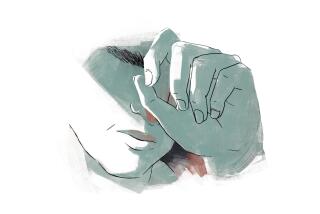Conference on Minorities and AIDS to Open : Health: Organizers hope to address the need to develop programs aimed at the growing numbers of Latinos and blacks with the disease.
- Share via
LONG BEACH — Health officials and community workers concerned about the increase of AIDS in ethnic communities in Long Beach are holding a conference Wednesday on how to overcome cultural barriers to preventing the disease.
“Cultural Dimensions of AIDS” is being presented by the Long Beach AIDS Network and funded in part by the city’s health department. Up to 100 nurses, social workers, educators and other community workers are expected to attend the nine-hour series of workshops that will be held at St. Mary Medical Center.
Organizers hope the conference will address the need to develop programs aimed specifically at the growing numbers of Latinos, blacks and other ethnic groups with acquired immune deficiency syndrome.
“The face of AIDS is changing,” said Ruth Bundy, preventive health services officer for the city’s Department of Public Health and Human Services. “There needs to to be more outreach into minority communities.”
Until recently, AIDS victims in Long Beach, as well as the rest of the nation, had primarily been gay white men. Statistics now indicate that Latino and black populations are increasingly at risk.
Every month this year, the number of new AIDS cases in Long Beach has increased by 25% over the same month last year. The number of new cases diagnosed in the first half of this year is 26% higher than the number for the same period in 1989. Most of that growth is in minority communities, according to health department statistics.
As of June 30, 1990, 820 cases of AIDS had been reported in Long Beach since health officials began keeping records on the disease. Blacks and Latinos each accounted for 11% of the total and whites for 76%.
In the first six months of this year, there were 113 new cases of AIDS. Latinos accounted for 13% and blacks 15%, while the number of new cases among whites declined to 69%.
Some health officials and community workers blame lack of education and communication in part for the spread of AIDS in minority communities.
In the past, many programs were aimed more toward literate white homosexuals. But minorities often pose drastically different problems and risk factors, health officials said.
“We can no longer use the melting-pot approach to health-care programs,” said Chris Sandoval, one of the conference’s speakers and president of the California Assn. of AIDS Agencies.
Many Latinos are immigrants. Some of them speak little English. Jennifer Andrews, head of the AIDS Project at St. Mary Medical Center, said many of the people she has worked with needed counseling but that it was always a scramble to find somebody who spoke Spanish and could help.
“Some people died before we could find a counselor for them,” she said.
One of the toughest cultural barriers is the “macho ethic” of Latino society, where talking about sex is “not acceptable,” men refuse to acknowledge homosexual relations and women hesitate to question them, said Luis Figueroa, education coordinator for the Long Beach AIDS network.
Health officials are seeing increasing numbers of cases where Latino women become infected after having sex with a man who has remained silent about relations he had with a prostitute or homosexual.
Figueroa recalled that one Latino woman he counseled had no idea what it meant when he told her that she was infected with the virus. Then the mother of four wept. “I can’t tell my husband,” she said. “He’ll beat me.”
Another barrier to AIDS education in Latino and black cultures, health workers said, is the strength of family values and religious beliefs.
“The predominance of Catholicism makes it difficult to reach out and create a message,” said Bundy of the city health department, who noted that many Latinos and blacks are opposed to using condoms on religious grounds.
Many minority AIDS victims are drug users, a group that is extremely difficult to work with, health workers report.
Sometimes, said Dr. Fen Rhodes, head of Cal State Long Beach’s AIDS project, health workers and educators can be “cavalier and indifferent” about cultural and religious beliefs. Other times, they may grow frustrated at what they perceive to be an indifference in minority populations toward the disease.
But AIDS project director Andrews said some of these minority victims are dealing with so many other crises--including poverty, drugs and abuse--that AIDS seems “just another problem.”
“It’s hard to say where it ends being a socioeconomic issue and turns into a cultural issue,” she said.
More to Read
Sign up for Essential California
The most important California stories and recommendations in your inbox every morning.
You may occasionally receive promotional content from the Los Angeles Times.













